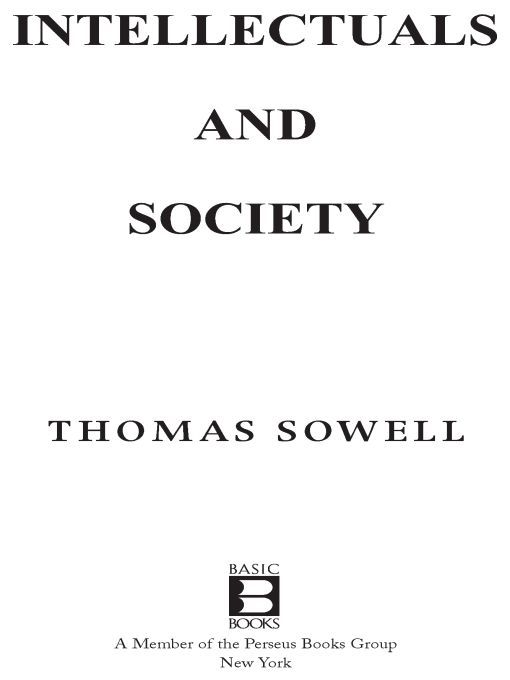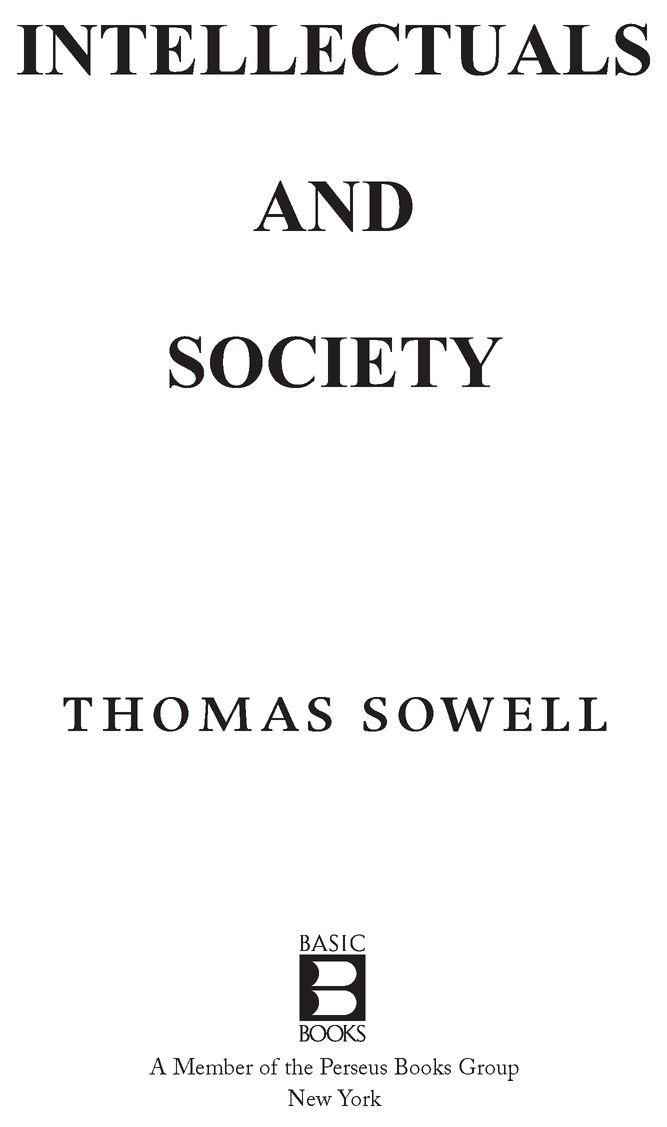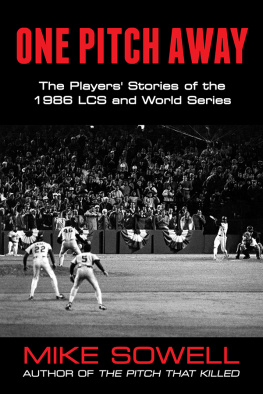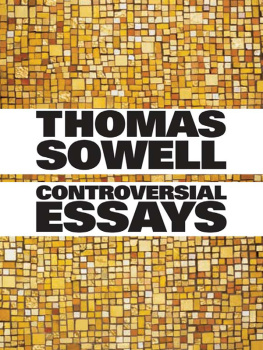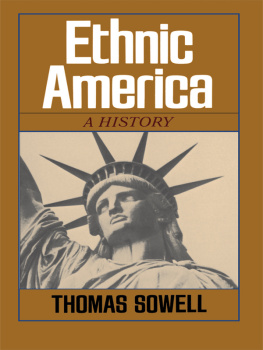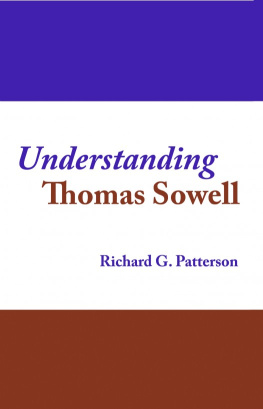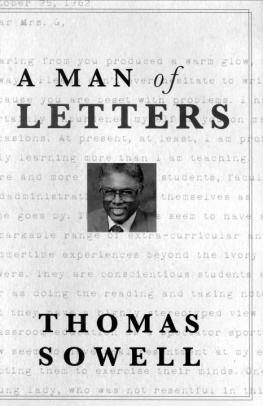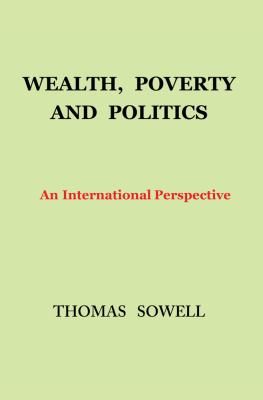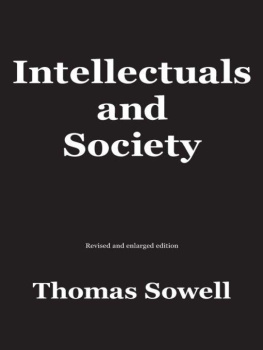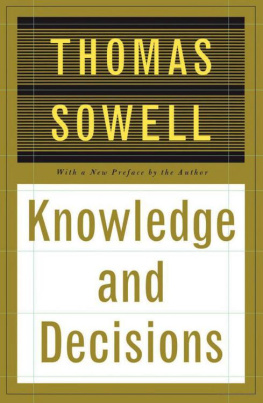Table of Contents
PREFACE
There has probably never been an era in history when intellectuals have played a larger role in society. When those who generate ideas, the intellectuals proper, are surrounded by a wide penumbra of those who disseminate those ideaswhether as journalists, teachers, staffers to legislators or clerks to judges, and other members of the intelligentsiatheir influence on the course of social evolution can be considerable, or even crucial. That influence has of course depended on the surrounding circumstances, including how free intellectuals have been to propagate their own ideas, rather than being instruments of state propaganda, as in totalitarian countries. There would of course be little point in studying the ideas expressed by prominent writers like Ilya Ehrenburg during the era of the Soviet Union, for these were simply the ideas permitted or advocated by the Soviet dictatorship. In short, the study of the influence of intellectuals is here a study of their influence where they have been freest to exert that influence, namely in modern democratic nations.
For very different reasons, this study of patterns among intellectuals will pay less attention to such an intellectual giant as Milton Friedman as to any number of intellectuals of lesser eminence, simply because Professor Friedman was in many ways very atypical of the intellectuals of his time, both in his scholarly work that won him a Nobel Prize and in his work as a popular commentator on issues of the day. A balanced general intellectual history of our times would have to give Professor Friedman a far larger amount of attention than a study which focuses on general patterns to which he was an outstanding exception. Aleksandr Solzhenitsyn was another landmark figure in the intellectual, moral and political history of his age who was likewise too atypical of contemporary intellectuals to be included in a study of the general patterns of the profession.
Many books have been written about intellectuals. Some take in-depth looks at particular prominent figures, Paul Johnsons Intellectuals being an especially incisive example. Other books on intellectuals focus on the ideas of particular eras. Richard A. Posners Public Intellectuals is about those intellectuals who directly address the public, while the focus in Intellectuals and Society is about intellectuals who influencesometimes shapepublic attitudes and beliefs, whether or not they are widely read by the population at large. As J.A. Schumpeter said, there are many Keynesians and Marxians who have never read a line of Keynes or Marx. They have gotten their ideas second- or third-hand from the intelligentsia.
Among the many things said by those who have studied intellectuals, a comment by Professor Mark Lilla of Columbia University in his book
The Reckless Mind is especially striking:
Distinguished professors, gifted poets, and influential journalists summoned their talents to convince all who would listen that modern tyrants were liberators and that their unconscionable crimes were noble, when seen in the proper perspective. Whoever takes it upon himself to write an honest intellectual history of twentieth-century Europe will need a strong stomach.
But he will need something more. He will need to overcome his disgust long enough to ponder the roots of this strange and puzzling phenomenon.
While Intellectuals and Society is not an intellectual history of twentieth-century Europethat would be a much larger project for someone much youngerit does attempt to unravel some of the puzzling phenomena in the world of the intellectuals, as that world impacts society at large. Rather than simply generalizing from the writings or behavior of particular intellectuals, this book will analyze both the vision and the incentives and constraints behind the general patterns found among contemporary members of the intelligentsia, as well as what they have said and its impact on the societies in which they said it.
Although we already know much about the biographies or ideologies of particular prominent intellectuals, systematic analyses of the nature and role of intellectuals as a group in society are much less common. This book seeks to develop such an analysis and to explore its implications for the direction in which the intelligentsia are taking our society and Western civilization in general.
Although this book is about intellectuals, it is not written for intellectuals. Its purpose is to achieve an understanding of an important social phenomenon and to share that understanding with those who wish to share it, in whatever walk of life they might be. Those among the intelligentsia who are looking for points to score or things at which to take umbrage will be left to their own devices. This book is written for those readers who are willing to join with me in a search for some understanding of a distinct segment of the population whose activities can have, and have had, momentous implications for nations and civilizations.
Thomas Sowell
Hoover Institution
Stanford University
ACKNOWLEDGMENTS
Like other books of mine, this one owes much to the dedicated work of my outstanding research assistants, Na Liu and Elizabeth Costa. Ms. Liu, having worked with me for twenty years, has not only ferreted out many facts but contributed many insights to this book, as she has to others. Now she also creates the computer files from which my books can be printed directly. My other assistant, Ms. Costa, does the copy-editing and fact-checking for me, and seldom does a lapse on my part escape her scrutiny. I have also benefitted from information or comments supplied by Dr. Gerald P. ODriscoll of the Cato Institute, Professor Lino A. Graglia of the University of Texas at Austin and Dr. Victor Davis Hanson of the Hoover Institution. Any errors or shortcomings which survive despite their efforts can only be my responsibility.
Chapter 1
Intellect and Intellectuals
Intelligence is quickness to apprehend as distinct from ability, which is capacity to act wisely on the thing apprehended.
Alfred North Whitehead
Intellect is not wisdom. There can be unwise intellect, as Thomas Carlyle characterized the thinking of Harriet Taylor, the friend and later wife of John Stuart Mill. Sheer brainpowerintellect, the capacity to grasp and manipulate complex concepts and ideascan be put at the service of concepts and ideas that lead to mistaken conclusions and unwise actions, in light of all the factors involved, including factors left out of some of the ingenious constructions of the intellect.
Karl Marxs Capital was a classic example of an intellectually masterful elaboration of a fundamental misconceptionin this case, the notion that labor, the physical handling of the materials and instruments of production, is the real source of wealth. Obviously, if this were true, countries with much labor and little technology or entrepreneurship would be more prosperous than countries with the reverse, when in fact it is blatantly obvious that the direct opposite is the case. Similarly with John Rawls elaborate and intricate A Theory of Justice, in which justice becomes categorically more important than any other social consideration. But, obviously, if any two things have any value at all, one cannot be categorically more valuable than the other. A diamond may be worth much more than a penny but enough pennies will be worth more than any diamond.

